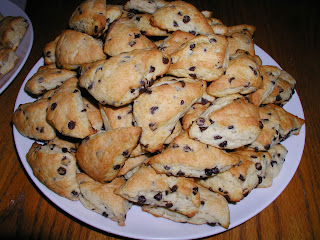 This recipe comes from one of my baking
classes at American River College. Of all the recipes I very specific
about the cream that you use. It calls for Manufacturing Cream,
which is basically heavier-than-heavy whipping cream. The only source for
it that I've found is Smart and Final, where you can only purchase it
in a ½ gallon carton. That amount works great when I'm making two
quadruple batches of scones for Sunday morning coffee time at church, but it's not so good
when I only want scones for breakfast. Substituting heavy whipping
cream for the manufacturing cream means I have to add a little more
flour and the resulting scones aren't quite
as tender, but they're good enough. And it's that substitution that
I'm passing on.
This recipe comes from one of my baking
classes at American River College. Of all the recipes I very specific
about the cream that you use. It calls for Manufacturing Cream,
which is basically heavier-than-heavy whipping cream. The only source for
it that I've found is Smart and Final, where you can only purchase it
in a ½ gallon carton. That amount works great when I'm making two
quadruple batches of scones for Sunday morning coffee time at church, but it's not so good
when I only want scones for breakfast. Substituting heavy whipping
cream for the manufacturing cream means I have to add a little more
flour and the resulting scones aren't quite
as tender, but they're good enough. And it's that substitution that
I'm passing on.
The basic scone recipe can be made into
pretty much any variation (flavor) that you want. For instance, I
frequently make coconut macadamia chocolate chip scones. Other
favorites are (plain) chocolate chip, cranberry pecan, and apricot
almond. Pretty much any dried fruit or nut can be used in the ¼ c
of “stuff”. (And really, ¼ c is just a guideline – I almost
always use more than that!)
Cream Scones
Ingredients
Ingredients
1 cup flour
2½ t baking powder
½ t salt
¼ c sugar
2½ t baking powder
½ t salt
¼ c sugar
¼ c “stuff” (chocolate chips,
dried fruit, nuts, etc.)
¾ c heavy cream
¾ c heavy cream
Instructions
Assemble ingredients.
Assemble ingredients.
Preheat oven to
425°. Line a baking sheet with parchment or wax paper. (The lining
is necessary unless you happen to be using a baking stone, and even
then it's a good idea.)
Combine all ingredients except cream in
a large bowl. Whisk together a few times just to make sure
everything's well mixed.
Add cream and mix gently with your
hands until it all comes together. (Yes!
Use your hands! A spoon or spatula will not get everything mixed,
and a mixer will make your dough really tough.)
Turn the dough out onto a lightly
floured surface and knead a few times until the dough feels somewhat
stiff. To knead, pat the dough into a squarish lump,
then fold it in
half.
Pick up the dough, turn it sideways, and repeat.
Pat into a circle or square.
Cut
into pieces.
Transfer pieces to baking sheet and
bake for 10-12 minutes, or until lightly browned.
After a minute or two, slide the parchment off the pan onto the rack. Let the scones cool for a few more minutes before taking them off the parchment.
The scones are at their absolute best while still warm from the oven, but you can serve them any time with an hour or two. They can be stored for a few days in an airtight container, but they will lose their flaky perfection quickly. It is possible, however, to make the dough the night before and store in the refrigerator, or even a week or so beforehand - store, well wrapped, in the freezer. If you've frozen the dough, you should let it thaw before cooking.
Happy Baking!










No comments:
Post a Comment